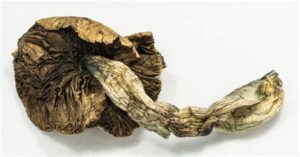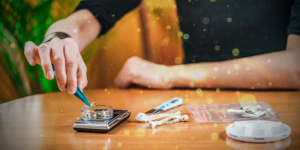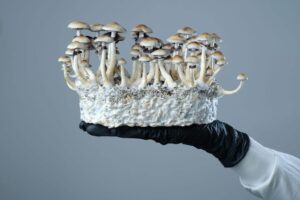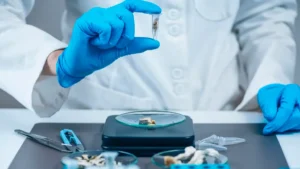How Can Psilocybin Affect Mental Health?
Psilocybin is a psychedelic chemical found in over 100 species of mushrooms. It can also be produced synthetically in a lab. This psychedelic chemical found in these “magic mushrooms” has been used for religious and spiritual purposes over a millennia by indigenous peoples worldwide.
Western researchers grew hip to the compound’s potential in the 1950s and 1960s, studying psilocybin’s effect on brain function and as a therapeutic substance. This line of research is currently having a resurgence; psilocybin is now being studied, alongside psychotherapy, as a treatment for certain mental health disorders.
Learn more about psilocybin, how it’s gaining popularity for use in mental health, its potential risks and side effects and where experts see its future as a medical treatment.
What Is Psilocybin?
Psilocybin is a chemical compound found in certain types of mushrooms. It is typically ingested orally, either as fresh or dried mushrooms, via a pill or powder in a capsule, brewed as a tea or added to other foods. Its psychedelic effects usually include visual and auditory hallucinations, altered mood and a distorted sense of space and time.
Psilocybin has a long history of being used recreationally that is, without medical approval. Per the U.S. Drug Enforcement Administration (DEA), psilocybin has no medical use, has a high potential for abuse and is classified as a Schedule I drug.
Despite this classification, several states and cities have moved to legalize and/or decriminalize psilocybin, including Ann Arbor, Michigan; Cambridge, Northampton and Somerville Massachusetts; Denver, Colorado; the state of Oregon; Oakland, San Francisco and Santa Cruz, California; and Washington D.C.
Psilocybin’s New Role in Mental Health

A recent uptick in scientific studies testing psilocybin as a mental health treatment is in part thanks to the U.S. Food and Drug Administration (FDA). In 2018, the FDA granted COMPASS Pathways, a mental health care company, a Breakthrough Therapy designation, enabling them to study the compound against treatment-resistant depression (depression which has not responded to two or more existing drugs). Usona Institute, a medical research company, was also granted a Breakthrough Therapy designation to study psilocybin as a treatment for major depressive disorder in 2019.
Additionally, according to the National Library of Medicine’s ClinicalTrials.gov site, there are more than 100 trials involving psilocybin currently active or recruiting participants worldwide.
While psilocybin remains under clinical research, it is not yet available for legal or medical use in therapists’ or doctors’ offices in the U.S with the exception of Oregon, which recently passed a measure that should go into effect sometime in January 2023.
Who Should Consider Psilocybin Therapy?
Although not currently available to the general public, psilocybin has shown promise in treating a handful of mental health conditions when administered by medical professionals and used alongside talk therapy and/or integration therapy.
Treatment-resistant depression (TRD): COMPASS Pathways’ latest clinical trials focused on psilocybin dosage efficacy, alongside psychological support, against TRD. The study found that a single 25 milligram dose of psilocybin significantly reduced participants’ depression compared to 10 milligrams and 1 milligram doses.
Depression and anxiety: Studies have shown that doses of 0.20 milligrams/kilograms to 0.40 milligrams/kilograms reduce the depression and anxiety felt by individuals living with cancer. This is an important breakthrough for end of life care.
A small study by Johns Hopkins’ Center for Psychedelic and Consciousness Research found that immediate psilocybin-assisted therapy (compared to delayed treatment) improved assessments of participants’ depression. Participants were not on antidepressant medications at the time of the trial.
Anorexia nervosa: A small 2022 exploratory study on individuals living with anorexia nervosa found that psilocybin therapy (with a 25 milligram dose) significantly reduced 40% of participants’ eating disorder psychopathology (dysfunction), including issues around body shape and eating concerns. Researchers report 90% of participants found the experience “meaningful and therapeutic.”
COMPASS Pathways continues to test psilocybin as a treatment for anorexia, with one study currently in Phase 2 of a clinical trial.
Addiction: At least one small pilot study found that moderate to high doses of psilocybin over 15 weeks seem to work substantially better than other, more typical smoking cessation therapies; 67% of participants had not smoked by the one-year follow-up, and 60% had abstained after the 16-month mark.
Another small preliminary study from 2015 found that psilocybin therapy significantly improved abstinence up to 36 weeks for individuals with alcohol dependence. The study also suggested that the more intense the first session, the less cravings the participant had.
Is Psilocybin Safe For Use During Therapy?

Researchers say psilocybin is one of the safest psychedelic drugs thanks to its low toxicity, low abuse potential, lack of long-term adverse effects, seemingly no physical dependence potential and rarity of overdose.
Without FDA approval or regulation, there are no widespread dosage recommendations for psilocybin, but it is often taken in 10 to 50 milligrams. Medical dosage tends to take the individual’s weight into account.
Per recent and ongoing studies on psilocybin and mental health, psilocybin is safest when taken under the supervision of licensed health care professionals. “Licensed health care professionals with clinical experience in mental health care or counseling will understand the subjective effects and subjective experience patients with mental illness,” says Ekaterina Malievskaia, M.D., the chief innovation officer and cofounder of COMPASS Pathways in London. “The role of a therapist is very important to ensure safe experience and quality of care.“
Psilocybin treatment is also likely safest in a calm and quiet environment, often with music playing. “Right now, the best practice is for patients not to get into arguments, not to read the news, not to watch TV before the session, but focus more internally,” says Dr. Malievskaia. “The session environment should be non-stimulating so they can go on their own internal journey without being influenced by the environment.” A stimulating environment could become unsettling, disorienting and anxiety provoking for an individual, she adds.
Psilocybin Side Effects, Risks and What To Know Before Use
Psilocybin is not recommended for individuals:
- With (or who are at risk for) psychotic disorders, such as schizophrenia and bipolar disorder, as psilocybin may be damaging or exacerbating, and may interact with certain medications
- With cardiovascular issues, because psilocybin can increase blood pressure and heart rate (a preliminary evaluation by the practitioner can help determine if you’re a candidate)
Hallucinations are common for a psilocybin session or “trip/journey” and while they may be eye-opening and welcome to a participant, they can also be frightening or disturbing, says Chuck Raison, director of clinical and translational research at Usona Institute in Madison, Wisconsin. These frightening hallucinations are also known as a bad trip, in which you may become anxious, agitated, confused and/or panicked. While this can happen at any dose, it’s safest to start at a low dose and see how that affects you before increasing.
Higher doses of 13 milligrams or higher, per Brown University, can lead to:
- Facial flushing and sweating
- Slowed sense of time
- Feeling separated from your body
Signs of a potential psilocybin overdose include:
- Dizziness
- Numbness in parts of the mouth
- Shivering or sweating
- Nausea
Psilocybin use can carry a risk of serious, long-term psychiatric conditions, depending on dosage and underlying conditions, including hallucinogen-persisting perception disorder (leads to flashbacks of the psilocybin experience) and drug-induced psychosis (loss of sense of reality).
The risk of these conditions makes it very important to be screened prior to use by a properly trained/educated practitioner who can help discern whether you’re a good candidate for treatment, and who will help guide/monitor the process.
The Future of Psilocybin and Mental Health

The outlook for psilocybin therapy is hopeful, but mixed.
“The results are very promising, but we need to continue doing research to understand what works for whom and what doses are safe,” says Dr. Malievskaia. “It requires really rigorous research, and hopefully we’ll get there in the next few years.”
Still, Dr. Malievskaia notes that the future depends on regulatory approval as well as medical insurance access and reimbursement. “Without access through national health systems and other insurances, there is no future,” she says. “It will always be a privilege of very few people who can afford it.”
Raison hopes that the mental health industry doesn’t mistakenly think of psilocybin as a cure-all, but instead opens it up for use in a responsible way with the “combined psychosocial human therapeutic treatment paired with this medication.”

